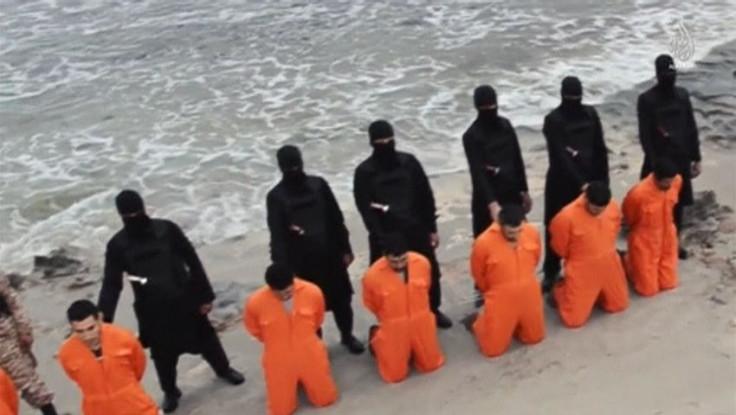New ISIS Beheading Video Points To ‘Islamic State’ Expansion In Libya

The Islamic State group released a video Sunday purporting to show the beheading of 21 Egyptian Coptic Christians. Militants claimed the video was filmed in Libya, and if true, this is the first time the group claimed to execute hostages outside of its self-declared caliphate spanning Iraq and Syria. It would also mark a major milestone in the ISIS strategy of recruiting local jihadist groups under its name.
The group also known as ISIS is active and gaining ground in Libya through the Shura Council of the Youth of Islam, based in the port city of Derna, which pledged allegiance to ISIS last October and traded its al Qaeda flags for the ISIS black standard.
That move reflects the same strategy ISIS used in Egypt’s Sinai peninsula, with the recruitment of pre-existing jihadist group Ansar Bait al-Maqdis and its rebranding under the ISIS name. After local groups pledge allegiance and are formally accepted by ISIS caliph Abu Bakr al-Baghdadi, they follow commands from ISIS leadership and begin recruiting to expand their presence in the country.
Last year, ISIS released a video announcing the caliphate’s expansion to several countries outside Iraq and Syria such as Yemen, Saudi Arabia, Libya and Algeria. At the time the video was largely taken as a “wish list” rather than a tangible expansion. The same video welcomed Ansar Bait al-Maqdis, or ABM, into the official ISIS circle. Weeks later, ABM’s ISIS-controlled media wing claimed responsibility for the deadliest attack on Egyptian forces in the Sinai since the military ousted President Mohammed Morsi in 2013 -- a double attack on military bases killing at least 30 Egyptian troops.
“The thing to watch for is ISIS actually directing activity in other countries,” Harleen Gambhir, an analyst at the Institute for the Study of War, said in an interview late last year, when she also predicted the first place this would happen was likely to be Libya, through the Shura Council.
The situation in Derna was as vulnerable to ISIS infitration as the Sinai. The city has been dominated by jihadist groups since the fall of Moammar Gadhafi’s regime in 2011 and is largely considered lawless and, like the Sinai, isolated from the rest of the country.
Libya is also home to Ansar al-Sharia, a jihadist group with strong ties to al Qaeda. The group has neither declared allegiance to nor denounced ISIS.
However, Libya is an even more perilous situation than Egypt because the country is now deep into a civil war. Former Gen. Khalifa Hifter leads a militia fighting the General National Congress, made up of Islamist militants aligned with an extremist movement called Libyan Dawn, also known by its Arabic name Fajr. Libyan Dawn seized the capital during the summer and announced its own government.
“At the very least, ISIS has left its footprints in Benghazi, Sirte, Tripoli and portions of Southern Libya,” wrote Andrew Engel, an Africa analyst at the Washington Institute for Near East policy.
ISIS has now begun to claim responsibility for attacks across the country. The group claimed a Jan. 3 attack that killed at least 10 Libyan soldiers at an army base. ISIS has also claimed responsibility for executing two Tunisian journalists in Libya.
Later last month, the group released a series of photo reports through social media accounts dedicated to disseminating news about its operations in Libya purporting to show several attacks in Tripoli. ISIS claimed responsibility for both an attack on the Algerian Embassy and a deadly shootout at the Corinthia Hotel last month in Tripoli that killed several Westerners. However, the General National Congress and Libyan Dawn officials denied ISIS’s involvement in the latter.
In other areas of Libya, ISIS has begun documenting its typical “governing” tactics made familiar by videos and images from Syria and Iraq, imposing its strict version of Sharia law on residents. In Barqa, one of the newly designated ISIS provinces in Libya, the group has reportedly burned cigarettes, banned smoking and destroyed religious monuments deemed un-Islamic, Engel said.
The video released on Sunday came from al-Hayat, the media center ISIS typically uses to disseminate propaganda aimed at the West, not one of the media channels used only for propaganda aimed directly at Libyans.
© Copyright IBTimes 2024. All rights reserved.






















